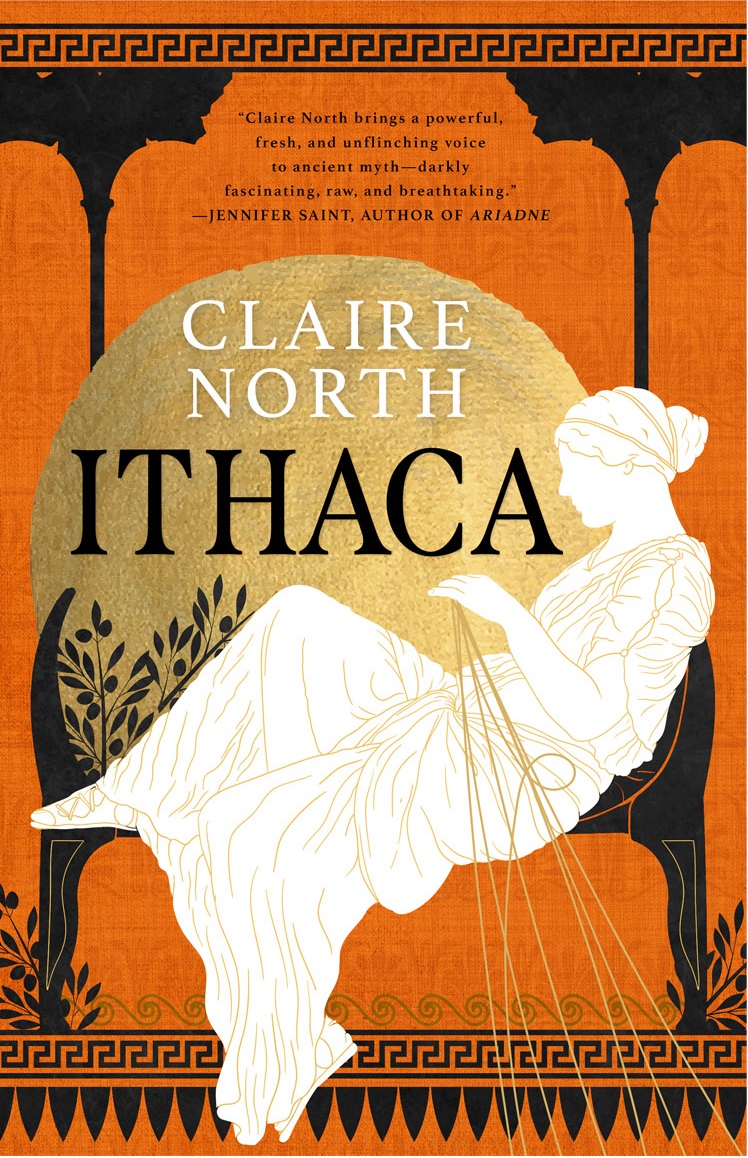Ithaca Paperback!

In celebration of the publication of Ithaca in paperback form (hurrah!) here are some random Ithaca-related facts…
There is a blissfully sparse archaeological record.When doing research for this trilogy, I did the obvious. Read the Odyssey, the Iliad, the Oresteia. Spent a large chunk of time online reading up on what we do know about Mycenaean Greece, watched documentaries, listened to a tonne of podcasts (shout out again to the Myths and Legends Podcast, which is fabulous) and was lucky enough that the British Museum was having an exhibition about Mycenae at the time, as well as extensive collections, so generally nerded around the BM.
What I did not do, was delve into the historiography of the period or dedicate myself to nine months of non-stop reading in academic libraries, and consequently have immediate imposter syndrome.
There are so, so many versions of these stories, so many translations, so many fragments and different takes, so much brilliant and fascinating scholarship, and many modern books that lean into that admirably. But a textbook was not my intention. My intention was to write as a story as strictly grounded in historical logic as I possibly could, in the most plausible version of what living, breathing kings and queens might actually be about, rather than to explore the mythology. In that sense, the sparse archaeological record was a gift – it’s harder to get things criminally wrong when we’re not entirely clear on what’s exactly right. I am a fiction writer, not an academic, and my intention is to have a conversation from a twenty first century perspective. Equally, given there is so much mythology, you’re inevitably forced to make decisions about which bits you’re just going to wiggle around, both for narrative effect and also because it raises such awkward questions as “wait, how old was Achilles’ son when he burned Troy to the ground? And hold on a moment, Paris was at the wedding of Achilles’ parents, presumably before Achilles was born, so he’s how old…?” and so on and so forth.
Thus, I spent a surprising amount of time reading up on the archaeological evidence of the tin and amber trade and maritime traffic in that era, since there needed to be reasons why anyone would care about the western isles at all, and not much time worrying about the legacy of Hercules. I spent a fair amount of time learning about the Hittites and their webs of alliances, since the loose web of diplomacy that bound the Greeks together at the time of Troy was also repeated to the east, and set a flavour for how relationships and politics worked. I spent a bit of time with the Scythians, Egyptians and Dacians, because the Greek world cannot be seen in a domestic vacuum. There was a lot of reading up on what the archaeology has to say about what people ate, and finally there was keeping in mind the twin narrative challenges of a) no written script and b) no coinage.
Yes, some writing was beginning to seep into the Greek world at this time, but not on a daily or meaningful basis. This immediately changes how you send messages and record events – the significance of a poet’s song becomes huge – and consequently also changes how trust, time and storytelling works. Equally, the lack of coinage means you’re functioning in a barter economy, where things are in a state of constant flux with no fixed, guaranteed value. It seems like a small thing, but it presents a genuine mindset shift for a twenty first century reader that needs to be handled without jarring people from what they’re reading, while also engaging with the reality of the time.
I also never once use the word “blue”. Given I am fairly liberal about using words like “accountancy” and “pillock”, this is an entirely nerdy thing that pleases only me.
Yes, it’s a trilogy….
… and each book is narrated by a different goddess.
One of the interesting hypotheses I stumbled on during the research phase was this: that the Iliad and Odyssey mark a shift away from powerful female figures in Greek stories, and towards stories dominated by men. And that given the period when these stories are set, there is also an interesting archaeological shift away from images of mother-goddesses, figures of raw female power that feature in so much of ancient history, towards a more ‘tamed’ female figure. Now you can argue whether or not you buy into this all you want, but certainly from a narrative point of view it’s an interesting idea to poke at. Of the three women most associated with the Iliad and Odyssey – Helen, Penelope and by association, Clytemnestra, two are profoundly ostracized in our cultural imaginations, and it’s only really Penelope – meek, diligent, chaste Penelope – who comes out the other side with the poet’s approval.
Given that there is a question of female power here, and how it’s wielded, it made sense to have these stories told by figures of ultimate female power – goddesses themselves – but goddesses who might also be aware of how their power is being diminished by events unfolding. Thus, book one is narrated by Hera, book two by Aphrodite and book three by Athena. Each has very different interests and views, but each embodies a different aspect of power – including power which is threatened or changing by the world around them.
The Geography Doesn’t Make Much Sense
It’s generally-accepted that the idea of Odysseus being from Ithaca as we know it – the geographical island – doesn’t make a huge amount of sense. It’s a very small island surrounded by many more rich and luscious isles, and even if we did accept for a moment that it’s where Odysseus came from, its size would make him of such microscopic geopolitical relevance that there is no way any kings would have any interest in what he has to say, no matter how clever, or that even a fairly uninteresting Spartan princess would end up married to him. Nor would it be worth a hundred suitors camping out in Penelope’s palace to get control of, not to put too fine a point on it, this small rock.
Therefore it is more logical to make Ithaca the (somewhat dubious) capital of a string of western islands, including Kefalonia and Zakynthos, and thus justify Odysseus mattering at all by his control of the western seas. Even then, questions remain unanswered. Where exactly did Aeolus live, who gave Odysseus a bag full of wind? Where are the Phaecians based, and if Odysseus sailed east to get there, then where the hell has he been hanging out?
In short, the geography is one of several things that you might sort of, to put it mildly, want to hand-wave your way through, all the while hoping no one is paying too much attention. It, along with how old everyone is and the fact that a lot of the suitors have, to our ears, quite similar sounding names, is one of those Homeric legacies that you just gotta deal with. As always, I made the choice to go with the most plausible political options, rather than the mythological, since I was always much more interested in monarchs murdering each other in the dark than minotaurs.





